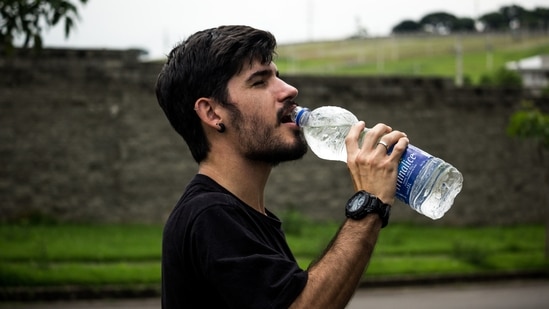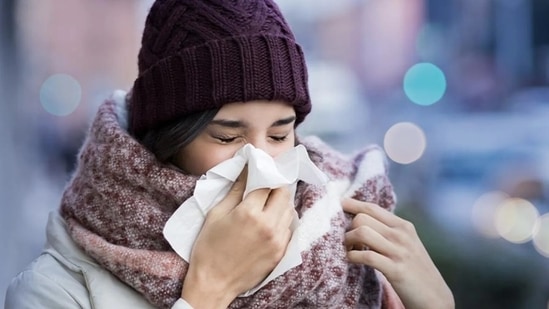
Sore throat, cold, fever slowing you down in this changing weather? Avoid these dehydration mistakes for faster recovery
5 months ago | 5 Views
It is that time of the year when common cold and cough are frequently encountered symptoms by all. On an average, adults get 4 to 6 colds per year. Cold and cough may be allergic in nature or associated with bacterial and/or viral infections which is commonly referred to as upper respiratory tract infections (URTI).
As per national health portal of India more than 4 crore cases of respiratory tract infections were reported in 2019. In addition to cough, patient may have complaints like sore throat, fever, muscle pain, runny nose, nasal blockage and can experience fatigue but what tends to get missed or overlooked during these conditions are the signs of dehydration.
What is dehydration?
In an interview with HT Lifestyle, Dr Abdul Majid Khan, Consultant Physician and Diabetologist at Olive Hospital in Hyderabad, shared, “Dehydration means depletion of body fluids due to either excessive losses or reduced intake or both. All types of fluids lost contain electrolytes in varying quantities, so fluid loss is always accompanied by some degree of electrolyte loss. This is referred to as silent dehydration, as one can miss it due to lack of awareness. Silent dehydration is a widespread concern which is also seen due to common cold and cough associated with upper respiratory tract infections. Electrolytes like sodium and chloride help to maintain body fluid balance while potassium, calcium and magnesium are involved in proper functioning of nerves and muscles.”

He explained, “In upper respiratory tract infections, fever itself leads to dehydration (fluid and electrolyte deficit) due to excessive sweating and increased breathing. Further as body consumes energy to fight the infection, increased energy requirements may lead to energy deficits. Sore throat which is a common initial symptom can impair fluid intake further adding up to dehydration. The deficit is further magnified due to inadequate intake of food and fluids cumulatively leading to fluid electrolyte energy deficits.”
Impact of fluid, electrolyte and energy losses in URTI
According to Dr Abdul Majid Khan, fluid, electrolyte and energy deficit in viral infection and URTI may lead to muscle pain, muscle cramp and muscle weakness. He elaborated, “Furthermore, dehydration may lead to thickening of secretions that become difficult to clear from lungs. Dehydration may also negatively impact respiratory symptoms like cough, impair immunity, delay recovery and increase the chances of recurrent infections. In a Knowledge Attitude and Practices study conducted with Indian physicians, it was found that these deficits in upper respiratory tract infections have high impact on recovery. The patient may continue to experience fatigue and muscle pain which will hamper their recovery.”

How can oral electrolyte drinks tackle dehydration during common cold and cough?
In the same study, it was found 87% of physicians agreed that fluids, electrolytes and energy supplementation given to patients with upper respiratory tract infections as adjuvants can help improve the speed of recovery of patients. Dr Abdul Majid Khan highlighted -
- An international association named American Society of Parenteral and Enteral Nutrition (APSEN) recommends drinking 60-120 ml of clear fluids containing electrolytes and calories every 15 minutes to thin the respiratory secretions during such illnesses. This indicates the importance of focusing on restoring fluids, electrolytes and energy in upper respiratory tract infections.
- Susceptibility to muscle cramp increases with the intake of water alone. Therefore, the intake of electrolytes along with water may help to ease muscle pain and cramps. During infections, the intake of carbohydrates should be maintained to protect against breakdown of proteins from muscles for energy.
- While fluid and electrolytes can be replenished by the standard WHO ORS (World Health Organization Oral Rehydration Solutions), they are best suited mainly for diarrheal conditions.
- In conditions like fever and other non-diarrheal illnesses, electrolyte drinks with energy can play an important role in recovery. This is corroborated by an Indian Expert Panel whose recommendation suggests that use of WHO ORS may not usually meet the energy goals in non-diarrheal conditions due to its low sugar content. Additionally, strong salty taste of WHO ORS makes it unpalatable which can affect adherence.
- The addition of energy (glucose) to fluid and electrolytes drinks helps address the energy needs as well as matching taste requirements. Certain ready-to-serve electrolyte drinks may also contain additional electrolytes or ingredients like magnesium which can support muscle function as well as micronutrients like Zinc, Selenium to additionally support immune function.
- While there are options of homemade preparations and coconut water easily available and accessible to address fluid electrolyte and energy deficits in upper respiratory tract infections, ready to serve electrolyte drinks can also be considered. Such formats contain a known concentration of fluids, electrolytes and energy with acceptably good taste and hygienic packaging which help to replenish fluids, electrolytes and energy and can assist the patient in the process of recovery.
Dr Abdul Majid Khan concluded, “Patients with common cold and cough associated with upper respiratory tract infections develop silent dehydration and energy deficits due to fever, sore throat, and the infection itself. This can lead to muscle pain and cramps which can hinder the recovery. One needs to restore these fluid electrolyte and energy deficits with an appropriate format so that the patient can recover faster. It would be advised to consult your doctor if you have high fever, cough, consistent muscle pain or symptoms of dehydration like dry tongue, dark coloured urine etc.”
Read Also: 9 medications that cause high blood pressure!





















